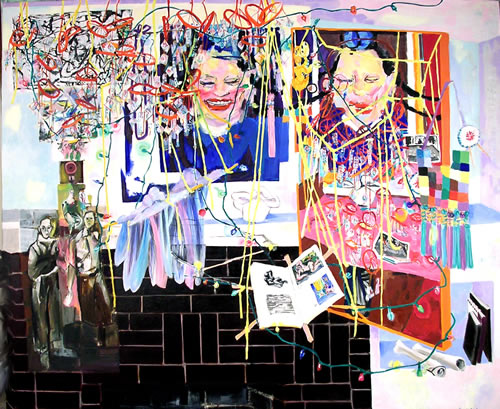From "Mao's
Pigtails" (there are several versions) came "Double
Mao". This work is supposed to represent the transmission
of mind. Here we see two 'Mao's' (also from a still life). We
find the picket sign, a Renaissance cloud complete with rain,
an art book opened to a page with Matisse paintings. And there
are the wind chimes, a string of colored lights and a Roksu
(the bib like thing which Buddhists wear after they have taken
a teacher and been given a name-they are usually black patchwork
to represent rags-the one in this painting is bright colored
squares of silk). "Double Mao" was renamed "Double
Wu" because my father insisted that no one would understand
the "Mao" explanation, and that Mao was a 'bad' man.
So, "Double Wu"...which of course sounds like the
letter "W"-is silly! "WU" is also the Chinese
word for the Japanese word "MU", which is the answer
to the Zen koan "Does a dog have Buddha nature?" It
means 'not' literally but in reference to the koan, the sound
is of more importance. "Mao" (meow) means "cat"
in Chinese! "Double Wu" has that same technique found
in "Hysterical Space". Another larger work that followed
this same idea is called "Hokko Zammai" (still unfinished)
which is the name of a short Buddhist verse. Another interesting
work is "Daughter of the Yellow River" which is an
illustration of a modern Chinese short story. (found in the
book CHINESE WESTERN) The illustration has been rendered
in Buddhist terms.

Hoyko Zammai Oil - Unfinished
|